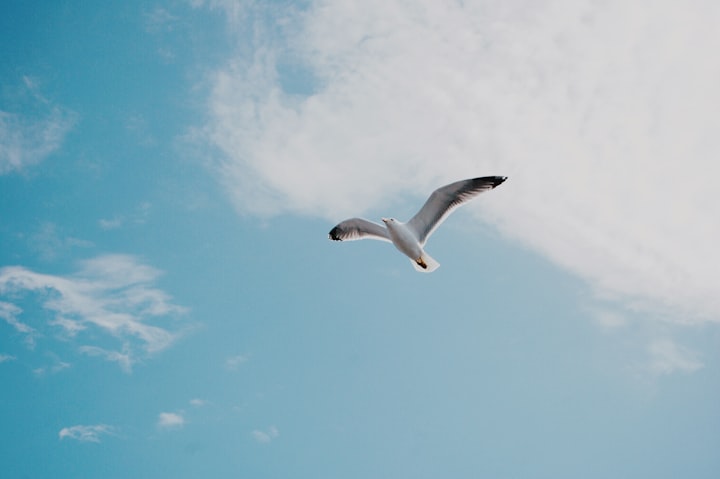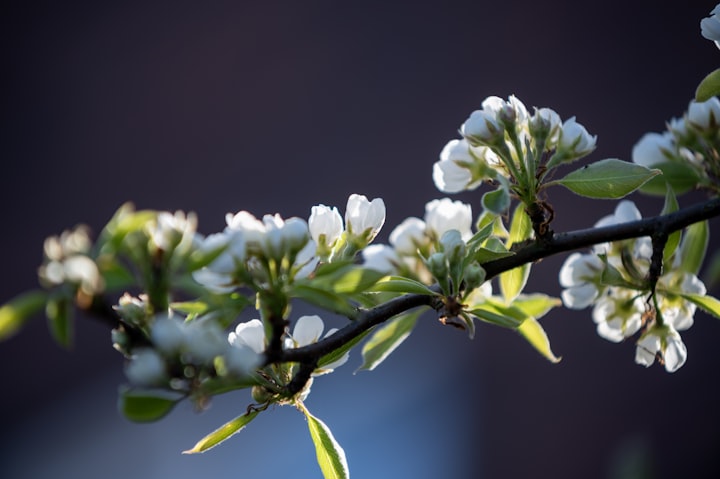
The water is colder than she expects. Not that she thought it would be boiling—not even this burning cerulean could offset her sense of realism—but somehow she expected... hot. It's not cold, not really, not even cool, sort of like bath water that had perhaps an ice cube or two dropped daintily in as an afterthought. The ocean comes slipping up in a thin plane along the sloping shore and laps over her toes, nails unpolished, the bubbles leaving a tickling line across her metatarsals, and retreats again, a mollusk into its blue porcelain shell, a tentative hand reaching, pulling back, reaching.
Coming here hadn't been her idea. She wasn't supposed to be here alone with the water. He was the one who had made the reservations. He'd seen the image of the shore online and urged her, let's go here. He was the one who booked the flights. She wasn't a beach person. She hated having to put on a bathing suit, the indignity of it, choosing between bearing all that skin and feeling like a prude. Given the choice, she would take a run-down backcountry ski cabin out of cell range in bear country over the ocean every time; that was where she felt freest, sexiest, and most alive. And now, looking back on it, maybe it should have been clear that his not knowing this one essential fact—that his casual unawareness of all she loved—was all the information she needed.
As it was, she had overlooked his lapses. He was the closest she'd ever come to the relationship she dreamed of. She'd been with adventurous people before, sure, and successful ones, too, and funny ones, and attractive ones, and ones that told the best stories—but never anyone with all those qualities at once. Until him. He was the kind of person who had suits and snow pants, expensive soap and hiking boots. He was brilliant at parties, could talk to anyone, and never seemed to fake his expansive smile. He was as boisterous as he was attentive, as successful at his high-powered law firm as he was down-to-earth at home. She should have known it was too good to be true.
She'd never thought to ask herself why he had chosen her, because the answer seemed obvious. She wasn't lacking in self esteem. She was proud of her unconventional life, working at ski resorts in the winter to save for her dirtbag summers, with occasional stints in handy work or grocery delivery or whatever needed doing. There was the book, too, which was actually coming along well for the first time in a decade now that she had secured a publisher. And she knew she was attractive, with her dark eyes and black hair and mischievous smile. She liked the way her old, ragged, hand-repaired clothes looked on her. She liked the stories in the fabric as much as she liked the stories in her scars. She was pretty damn proud of her life, herself, her happiness. So, no. She had never questioned why he had ended up with her. Not until now.
She's made it a ways down the beach by now. It seems to stretch on forever, this water. She squints, and the shade changes to teal. She widens her eyes, and it deepens into that same deep blue. She can't believe how blue it is; the photos did not do it justice. She is getting used to the temperature of the water now. She turns towards the waves, fully squaring her shoulders towards them for the first time. They roar and crash in a spray of foam over clusters of rocks. As she looks, she sees the seagull.
It is perched on a rock a few yards out into the water, one just above the line where the water crashes. She thinks it is a seagull, at least, though it looks different than the ones she's used to; it is darker, less brilliantly white. The breeze picks at its feathers, which look soft and downy. Its webbed feet, ending in little black claws, grip the surface of the dark, wet rock. It's small. It almost looks like a baby. It is staring right at her with what looks like an inquisitive expression. Its eyes are piercing, though not unfriendly, a little black pupil encircled with a yellow iris. As she watches, it tilts its head one way, then the other. She's close enough that she thinks she might scare it away, but it doesn't budge.
She doesn't know how to behave in its presence. She's been around enough wildlife in the woods to know what to expect from encounters with non-humans. She's yelled at grizzlies and intimidated a stalking mountain lion. Yet she feels self-conscious now under the gaze of the seagull. It's sure of itself, standing there, unflinching. Another wave comes now and crashes against the rock, the water barely grazing just below the place where its feet are perched, and yet the bird does not move.
"Hello," she ventures. She hasn't spoken to anyone in two days, and her voice is gravelly with unuse. She clears her throat and tries again, laughing a little as she says, "Hi there."
The seagull cocks its head.
"It's okay," she says, though she doesn't know why. She looks down at her bare feet in the wet sand, sinking slowly down as the wave retreats. She returns her gaze to the seagull. It's a few inches closer now, perched on the edge of the rock as if trying to get a good look at her.
"Oh!" she exclaims, surprised. The bird flinches a little, then straightens. "I'm sorry, you scared me."
The bird is still staring.
I've lost my mind, she thinks. I'm talking to a seagull. And then she realizes that she's said it aloud, because the bird has tilted its head the other direction as if in response.
"I mean, not that you're not worth talking to," she babbles. "You seem pretty great."
Is this what it's come to? Standing on the shore of an idyllic tropical island, talking to a bird, otherwise alone?
For a moment, self-conscious in the moment's absurdity, she wants to curse him—the man who left her. Kick him. Punch him in the face. She didn't react much when she finally fit the pieces together: the mysterious late nights, the furtive phone-guarding, the edginess replacing what had been—for the better part of two years—a peaceful, relatively obstacle-free relationship. In the end, it was as cliche as it could get: his new executive assistant. Younger, more corporate, more his style.
She hadn't even yelled. She'd just sighed, disappointed, while he cried through his admission.
"I'm sorry," he wailed melodramatically, the tears running down his face, hands clenched together like a penitent. "I'll cancel the trip."
"Like hell you will," she replied. "You're paying for it all. And I'm going without you."
Really, if she's honest with herself, she knew from the beginning it wasn't going to work out. Somewhere, in the back of her head, she knew he was going to end up being catastrophically disappointing. Still, it stings. To be here again, alone. To have to pick up the pieces of another potential world that came crumbling down. To have imagined a future, seen it all in front of her eyes, and then to have to wipe the sand away.
She's in her mid thirties now. Most of her friends are untethered like her: seasonal workers, dirtbags, hikers, people who have committed themselves to living as simply as possible so that they can spend what little money they do have outside. But the odd times when she communicates with what she has come to think of as "normal" people—her sisters, her parents, her friends from college—she feels as though they are judging her. She knows no one from that life can understand her string of lovers, her lack of house or consistent home base, her prioritizing of wandering and snow and mountains over comfort and stability. For the better part of the last two years, she'd begun to taste that lifestyle with him, and while it mostly made her nervous, antsy and edgy and crawling in her skin, even she had to admit that there was something nice about having a place.
I'll never know what that's like now, she's thinking. Despite her doubts, despite the unconscious knowledge that things would not work out, she had started to form certain images in her head: a nice apartment in the city, or maybe even a small townhouse, with a kitchen that had a gas stove that didn't feel like it was going to fall apart at any moment, a carpeted staircase, more than one tiny bathroom. She'd have books to write by then, loads of them, and articles, and interviews and maybe even a creative writing workshop or two on the side. She'd still ski in the winter, of course, and spend the summers in the desert, but she'd have a place to come back to. He'd be there, and they'd support each other, go for hikes together, have friends over—live the perfect life.
Then he left. And the desire for that life went with him.
What did she have now, then? This trip, which he had dutifully paid for. A storage unit now full of her half of the apartment. Enough savings to find a place when she wanted to. The book.
And this seagull.
It had probably only been moments, but it felt like an eternity as wave after wave crashed and rolled over her feet, her ankles. She and the bird stood there, eyes locked while her mind ricocheted through her past and future. She wondered what was going through the seagull's mind. Was it thinking about food? Finding a mate? Raising a family? She supposed it probably wasn't thinking the same way she was, not really. It probably didn't spend its days wandering the beach and wondering what it was doing with its life. It probably didn't replay all the memories from failed relationships or preview the future with all its trials. It probably didn't feel lost or afraid or suddenly, stabbingly alone.
As she stared into its eyes, her peripheral vision taking in its dusty feathers, its calloused webbed feet, the ocean spraying the rock below it, she began to notice her shoulders. They were lowering. She hadn't realized she'd been holding them up. She also became aware of her face. Her lips were turned upwards in a slight smile, and them more she noticed, the more they rose.
And then she was laughing.
The seagull stood for a moment longer, taking in the sight of the woman with the dark hair and the bikini top and the work black shorts, laughing at the waves. She bent over and put her hands into the water, splashing it on her face, down her back. She walked further out to sea, the spray crashing around her. What lay beyond that ocean? Neither she nor the gull knew, not exactly, not intimately. Mountains somewhere, almost certainly. And snow, and friends, and everything either of them had ever known. There were people the woman had loved: some who had been good, all who had been human. There was the most recent man who had betrayed her, but he had his own pain. There was the matter of the future, and getting the book written, but it could wait. There was a place out there, somewhere, where one day she would land. But for now, she was content to perch on this precipice. This moment. This sea.
She was up to her waist now. The water felt warmer. Maybe it hadn't been so cold in the first place. Maybe the ocean is a good place to be after all. She thinks of all the snow she's seen. All the life. She walks in further.
Above her, the seagull soars in one great circle. She waves at it as it swoops lower, and then away.
About the Creator
Sarahmarie Specht-Bird
A writer, teacher, traveler, and long-distance hiker in pursuit of a life that blends them all. Read trail dispatches and adventure stories at my website.
Enjoyed the story? Support the Creator.
Subscribe for free to receive all their stories in your feed. You could also pledge your support or give them a one-off tip, letting them know you appreciate their work.






Comments (1)
Thank you, I enjoyed that. We all need some time for self reflection. an enjoyable read.